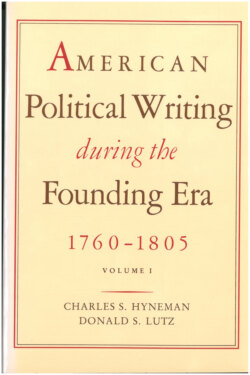Читать книгу American Political Writing During the Founding Era: 1760–1805 - Группа авторов - Страница 7
На сайте Литреса книга снята с продажи.
ОглавлениеACKNOWLEDGMENTS
This compilation of the best writing of the founding fathers received the warm support of William J. Baroody, Sr., from its inception until his death, and that relationship continued when William J. Baroody, Jr., succeeded his father as President of American Enterprise Institute for Public Policy Research. From the beginning AEI picked up the tab for travel and living costs incurred by either of the editors in visiting libraries and meeting occasionally in conference, and for reproduction of pamphlets and newspaper articles from which final selection of items was made. Howard R. Penniman was a skillful negotiator of the terms and conditions of this collaboration, later joined by Austin Ranney, who came to share with Penniman some of the responsibility for AEI’s projects relating to American politics. To all these men everyone who finds these two volumes useful is indebted. For two years the Woodrow Wilson International Center for Scholars provided the senior editor a living and a room for work and accumulation of litter, all of which necessities for scholarship contributed substantially to this project. Finally, Richard Ware and the Earhart Foundation once more exhibited a disposition to come to the relief of the editors when commendable ambition of either of them rubbed too abrasively against limited resources.
There is no chance of saying too much in favor of the Huntington Library as a place to explore the holdings they have accumulated. For the literature of the founding period their collection is voluminous. Without miss, in several visits, the service staff was genial, courteous, diligent, and knowledgeable, words especially applicable to those we mainly did business with: Virginia J. Renner, Noelle Jackson, and Mary Wright in Readers’ Services; Barbara Quinn of Photographic Reproduction; and Senior Research Scholar Ray A. Billington. Staff of the Rare Book Room of the Library of Congress were consistently courteous and concerned to meet every request. Anne C. Palumbo at the Woodrow Wilson Center and Raymond L. Faust at Indiana University helped in the early stages of the search for elusive material and have earned our appreciation.
Jack P. Greene of the Johns Hopkins University, Ronald M. Peters of the University of Oklahoma, Gordon S. Wood of Brown University, and James M. Banner, Jr., Director of the American Association for the Advancement of the Humanities, each made suggestions for inclusion in this collection which were heeded. Although we appreciate their interest and efforts, their approval for what has finally appeared in these two volumes was neither sought nor given. Responsibility for what was finally included for publication rests solely with the editors.
Dean Charles F. Bonser, Professor Charles Moffatt, and Judy Deckard threw the doors of Indiana University wide open for the comfort and convenience of the senior member of the team. The junior member did much of the culling and assembly of the manuscript while on a leave granted by the Faculty Development Leave Committee of the University of Houston. Professor David Brady, Professor Richard Hofstetter, and Provost George Magner at the University of Houston each made administrative decisions which eased the work or made available resources for work on the manuscript. Final preparation of the manuscript by the junior editor was done as part of the program of Liberty Fund, Inc. Last but not least Sharon McCormick, Martha Knutson, Lucy Redding, and Denise Reddick ably assisted in the final manuscript preparation.
